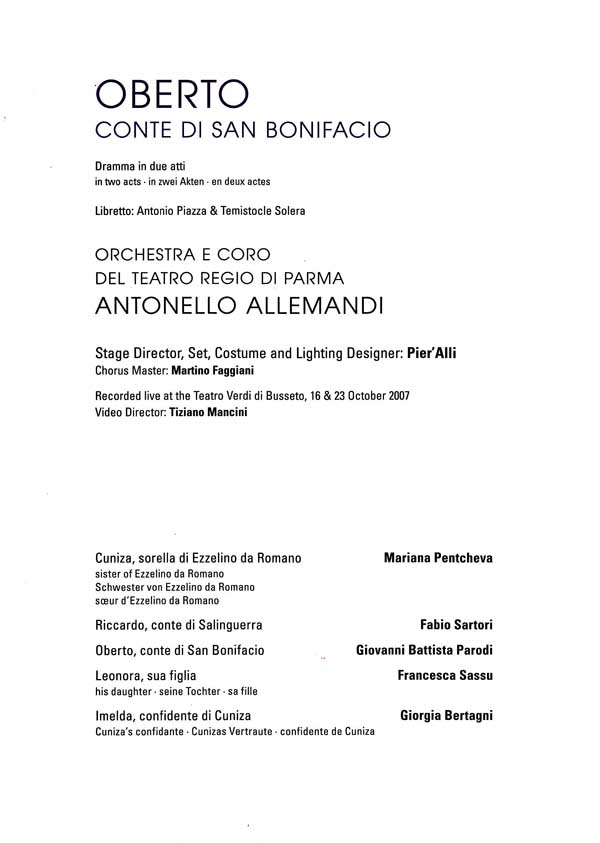Oberto Conte Di San Bonifacio was Verdi’s first opera. Its premiere was at La Scala on November 17, 1839. Oberto’s modest success was sufficient to earn its composer a contract to produce three more operas for the Milan theater. Before going further, a word about what books on Verdi are, in my opinion, best for someone who wants to learn more about the composer.
The standard biography of Verdi is by Mary Jane Phillips-Matz (Verdi: A Biography). Released in 1996 it has received near universal praise. However, I find it a dreary affair that manages to take a fascinating life which was at the heart of 19th century Italy and turn it into a wordy, long, and boring affair that seems to evince no understanding of Verdi’s nature or work. It’s the only book on Verdi that I didn’t finish. If you really want to learn about Verdi and his operas nothing compares to Julian Budden’s three volume The Operas of Verdi. The three volumes are hard to find and are pricey, but if Verdi is your passion, they are indispensable.They contain biographical information combined with detailed analyses of all of Verdi’s operas. Whether you’re a neophyte, an advanced listener, or a professional you’ll find this book a trove of information. Its only shortcoming is that it doesn’t cover the Requiem Mass – Verdi’s sacred opera. Also recommended is Verdi a Documentary Study which is out of print, but is available used. It main value is its wonderful pictures.
Oberto is the only opera by Verdi’ whose literary source is unknown. Temistocle Solera is credited with it’s libretto though Budden says that most of its text was written by Antonio Piazza. At the center of the story is the relationship between Oberto and his daughter Leonora. The father-daughter interaction was to concern Verdi throughout his career right up until his last opera, Falstaff staged 54 years after Oberto. When you listen to Oberto you realize that the germ of Verdi was there from the start. No one in 1839 could have predicted how prodigious a tree a would sprout from that seed. There’s no career in art that spanned the arc of Verdi’s.
The story of Oberto is simple. The time is 1228. Leonora (soprano)the daughter of Count Oberto (bass) has been seduced and then abandoned by Riccardo (tenor). He is about to marry Cuniza (mezzo-soprano) when the absent father returns and confronts first his errant daughter and then her seducer. Cuniza calls off the marriage and advises Riccardo to marry Leonora. Instead he kills Oberto in a duel and flees Italy full of remorse and shame because he killed an old man. Leonora enters a convent. Cuniza goes on to other unspecified activities. Two acts.
There are a several good tunes, but not one great one. Despite a number of musical crudities the music sounds like Verdi. Here is the quartet (which Verdi thought good) from the second act when Riccardo is confronted by both women and Oberto. The excerpt continues until the end of the scene when the two men rush off to continue the duel that the two women interrupted. Oberto quartet
This production was performed at the 300 seat Teatro Verdi in Busseto – Verdi’s hometown. The stage was mostly bare while the costumes were appropriate for the time of the opera’s composition rather than its stated epoch. The production was quite effective and made good use of the theater’s small stage. Director Pier’Alli had his singers use a lot of stylized operatic gestures which surprisingly were quite effective and fitted the emotive drive characteristic of Verdi, even in his first outing.
The performers were mostly quite good. None of the parts makes great demands on the singers. For example, Leonora’s part never goes above an A below high C. Francesca Sassu who sang Leonora is a young soprano who is still under 30 (born 1984). She has a pleasant lyric soprano which handled her role with ease.
Bulgarian mezzo-soprano Mariana Pentcheva was Cuniza. She has sung in many of Europe’s leading opera houses and will sing in Australia later this year. She has a Verdi type mezzo and seems to be devoting most of her time to his music. The role is not difficult and doesn’t offer a singer much of a chance to shine. Tenor Fabio Sartori has a dark spinto voice that’s right for many of Verdi’s heavier tenor roles. He has sung at La Scala and most of Europe’s major houses. He was quite good as the faithless lover. The weakest singing came from Giovanni Battista Parodi in the title role. His voice though serviceable is slightly dry and lacked the brilliance needed for his part.
The conductor, Antonello Allemandi, seemed an accomplished Verdian. He got all that was in this score. I’d like to hear him conduct one Verdi’s later works. His pace was brisk and fully supported the singers and the action.
Oberto is clearly not a prime time opera. Were it not written by Verdi it would garner no notice. But since we know the path Verdi took and where he ended up it serves as a useful reference point for anyone interested in Italian opera in general and Verdi specifically. If I were near a theater that was performing it, I’d go.









[…] tiny (300 seats) Teatro Verdi. This was also the site of the company’s mounting of Oberto. The lilliputian dimensions of the theater mandated a small staging which the company managed with […]